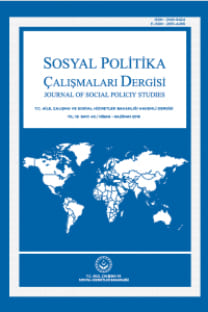Çocuğa Yönelik Çağdaş Sosyal Politika Yaklaşımları
Bu çalışmada çocuğa yönelik çağdaş sosyal politikayaklaşımları ortaya konulmaya çalışılmıştır. Sosyalpolitika ise, sosyal adaleti sağlama ve var olaneşitsizlikleri en aza indirmeye çalışma faaliyetlerinin birbütünü olarak düşünülmüş ve tanımlanmıştır. Buradanyola çıkarak, eşitlikçi, özgürlükçü, faydacı ve sözleşmecikuramların ışığında çocuğa yönelik çağdaş sosyalpolitika yaklaşımları incelenmiştir. Bu yaklaşımlarşöyledir: Temel gereksinimler yaklaşımı, çocuk haklarısözleşmeleri ve beslenme hakları yaklaşımı.Temel gereksinimler yaklaşımı, çocukların yaşamınıdevam ettirebilmesi için gereken asgari düzeydekinimetlerin sağlanması üzerinde yoğunlaşmaktadır.Uluslararası bağlayıcılığı olan sözleşmeler ise, çocuklarınhaklarının yasalarla güvence altına alınmasını teşviketmektedir. Çocuğun yararı ilkesi, aile ve devletinsorumluluğu, yeteneklerin geliştirilmesi hakkı, yaşamahakkı ve sağlıklı olma hakkı da eşitlikçi, özgürlükçü vefaydacı kuramların ışığında değerlendirilmiştir. Beslenmehakları yaklaşımı ise beslenme haklarının tarihçesi,beslenme hakkı ve çocukların önceliği altbaşlıklarıaltında yine aynı kuramsal çerçeve içerisindedeğerlendirilmiştir. Bu çalışma bir belgelik taramasıolduğu için konuya felsefi, tarihsel ve siyasal açıdanyaklaşılmıştır. Bu nedenle çalışmada somut sonuçlarayer verilmemiş, kuramlar ışığında çocuğa yönelik çağdaşsosyal politika yaklaşımları değerlendirilmiştir. Buçalışmanın amacı çocuklara yönelik sosyal politikauygulamalarını gerçek yaşamdan örnekler vererekaçıklamak değil, yazın alanında eksik olduğu düşünülen,uygulamaların felsefi altyapısını oluşturan yaklaşımlarıkuramsal bir çerçeveden değerlendirmektir.
Anahtar Kelimeler:
Sosyal politika, çocuk, kuramsal yaklaşımlar, eşitlikçilik, özgürlükçülük, sözleşmecilik
Contemporary Social Policy Approaches Towards Children
The main objective of this study is to reveal themodern theoretical social policy approaches towardschildren. Social policy is defined and thought as theprocess where measures are taken to minimise theexisting inequalities within a society. Contemporarysocial policy approaches towards are put forward andevaluated within the theoretical framework (egalitarian,libertarian, contractarian and utilitarian). Theseapproaches are as follows: Basic needs approach,child rights conventions, nutrition rights.Basic needs approach concentrates on providingat least the minimum levels of goods and services tokeep children alive. Contractarian approaches aretrying to ensure that all children benefit from the samerights within the legal framework. The best interest ofchild, the responsibility of the family and thegovernment, the right to enhance abilities and, theright to be healthy principles are also evaluated withinthe theoretical framework (egalitarian, libertarian,contractarian and utilitarian). Nutrition rights are alsocovered under these subtitles: history of nutritionrights, nutrition rights and the priority of children. Asthis study is a literature review, the subjects arediscussed in a historical, philosophical and politicalcontext. Therefore there are no specific results in thispaper. Hence, contemporary social policy approachestowards children are reviewed in a theoretical manner.The aim of this paper is not to discuss the real lifepractices but to thoroughly adress the contemporaryapproaches to child social policy.
Keywords:
Social policy, child, theoretical approaches, contractarianism.egalitarianism, libertarianism,
___
- Anderson, E.S., (1999), ‘‘Against Luck Egalitarianism: What is the Point of Equality’’, Ethics 109, 287-337.
- Aries, P., (1962), Centuries of Childhood: A Social History of Family Life, New York: Knopf, Vintage Books.
- Arneson, R., (2005), ‘‘Cracked Foundations of Liberal Equality’’, J.Burley (ed.) içinde, Ronald Dworkin and His Critic, Oxford: Basil Blackwell, 79-98.
- Boucher, D., Kelly, P (ed.)., (1998), Social Justice from Hume to Walzer, New York: Routledge.
- Burley, J.(ed.)., (2005), Ronald Dworkin and His Critic, Oxford: Basil Blackwell.
- Carlson, A., Wardlaw, T. M., (1990), A Global, Regional and Country Assessment of Child Malnutrition, New York: UNICEF Publications
- Kopelman, L.M., (2007), ‘‘Using the Best İnterest Stan- dard to Decide Whether to Test Children for Un- treatable, Late-Onset Genetic Diseases’’, Jour- nal of Medicine and Philosophy, 32, 375-394.
- Langan, J.P., (1977), ‘‘Rawls, Nozick and The Search for Social Justice’’, Theological Studies 38(2), 346-359.
- Lauchli, M.U., (1994), ‘‘What Distrubutive Justice- The Legal Theories of Rawls and Nozick’’, Tilburg Fo- reign Law Review, Vol.4, 169-205.
- MacLennan, E., (1993), ‘‘Çalışma Hayatında Çocuk Hakları’’, B.Franklin (Der.) içinde, Çocuk Hakları, İstanbul: Ayrıntı Yayınları, 142-163.
- Mathes, E.W., (1981), ‘‘Maslow’s Hierarchy of Needs As a Guide for Living’’, Journal of Humanistic Psyc- hology, 21, 69-72.
- McClelland, J.S., (1996), A History of Western Political Thought, New York:Routledge.
- Meehl, P.E., (1992), ‘‘Needs (Murray, 1938) and State- Variables (Skinner, 1938)’’, Psychological Re- ports, 70(2), 407-50.
- Moyet, L.J., (2003), ‘‘Maslow’s Hierarchy of Needs Revi- sited’’, Nursing Forum, 38(2), 3-4.
- Murray, H.A., (1938), Explorations in Personality, A Clini- cal and Experimental Study of Fifty Men of Colle- ge Age, NewYork: Oxford University Press.
- Nozick, R., (2004), ‘‘An Entitlement Theory’’, M. Clayton;A.Williams (ed.) içinde, 85-110.
- Pojman, L., (1997), ‘‘The Nature and Value of Equality’’, L. Pojman; R. Westmoreland (ed.) içinde, Equality: Selected Readings, New York: Oxford University Press, 1-17.
- Pojman, R., Westmoreland, R(ed.)., (1997), Equality: Selected Readings, New York: Oxford University Press.
- Press of Harvard University Press.
- Taylor, R.S., (2003), ‘‘Rawls Defense of The Priority of Liberty’’, Philosophy and Public Affairs, 31(3), 246-271.
- Triplet, R.G., (1992), ‘‘Henry A. Murray The Making of a Psychlogist?’’, The American Psychlogist, 47 (2), 299-307.
- UNCHR (2007), Legislative History of The Convention on The Rights of The Child, Geneva.
- UNICEF (1987), Children’s Rights: A Question of Obli- gaations, New York and Geneva: UNICEF Pub- lications.
- UNICEF (1989), Questions and Answers in The Con- vention on The Rights Child, New York-Geneva: Centre for Human Rights.
- Vidar, M., (2003), The Right to Food in International Law, Rome: FAO.
- London: Clerandon Press.
- ISSN: 2148-9424
- Yayın Aralığı: Yılda 4 Sayı
- Başlangıç: 2012
- Yayıncı: Aile,Çalışma ve Sosyal Hizmetler Bakanlığı
Sayıdaki Diğer Makaleler
Yaşlılıkta Teknolojik Yeniliklerin Kabulünü Etkileyen Sosyalizasyon Süreci
Doç. Dr. Yasemin ÖZKAN, Yrd. Doç. Dr. Eda PURUTÇUOĞLU
Çocuğa Yönelik Çağdaş Sosyal Politika Yaklaşımları
Sosyal Çalışmada Gereksinim Kavramı ve Çocuk Refahı Sisteminde Gereksinim Temelli Politikalar
Uzm. Hem. Hacer ATAMAN, Prof. Dr. Hediye ARSLAN
Anne Baba Kaybının Çocuklar Üzerindeki Etkileri
Şenol DURAN, Doç. Dr. Zeynep HAMAMCI
Cinsel Sağlık Eğitiminin Önemi
